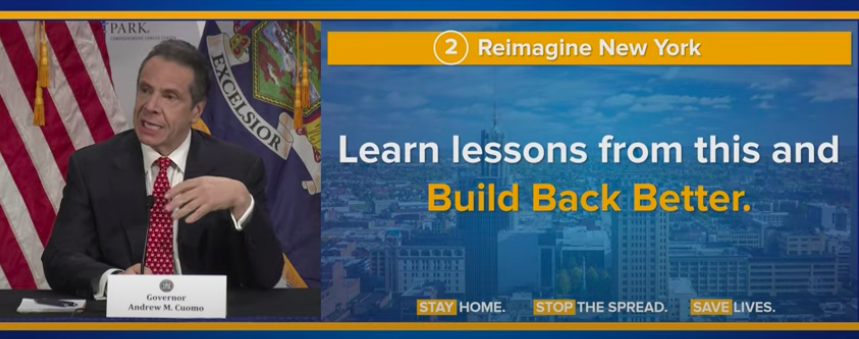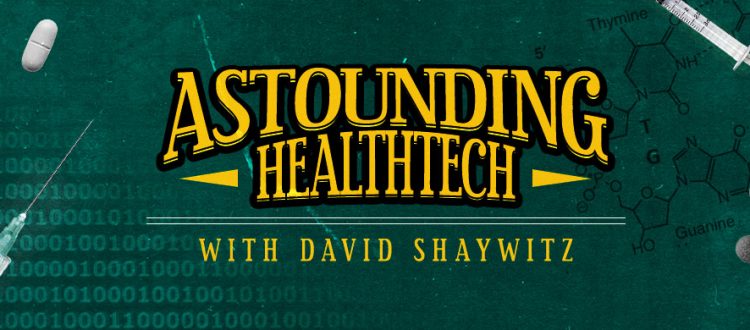Build Back Better

David Shaywitz
As the nation has struggled to cope with the devastation of the COVID-19 pandemic, New York Governor Andrew Cuomo has become the voice so many have looked to for support and leadership.
What Cuomo seems both to offer and effectively communicate is not just a mastery of the facts, but also a grounded yet hopeful narrative. The story he projects serves as a resonant, unifying, activating force that helps us to see our collective trauma as a valuable opportunity to grow.
He’s challenging us “to learn the lessons and to build back better.”

The ability to reimagine your life story in a more constructive way allows some to endure unimaginable suffering and emerge intact, even stronger, in the aftermath. Such “super-survivors,” David Brooks wrote in 2015, leaning on extensive psychology research on post-traumatic growth by Richard Tedeschi among others, have traits “that enable them to come back stronger than ever. These people are often deluded in good ways about their own abilities, but completely realistic about their situations.”
Post-traumatic growth “is not blind optimism, denial, or deception of self or others,” Tedeschi told me. “It does not dismiss distress and loss.” Rather, he argues in his latest book, Transformed by Trauma, which focuses on military veterans, the experience of growth “is a process – a difficult one, and an outcome that is life-changing and worth the struggle.”
The key, Brooks continues, is the ability “to write a new story that imagines a life better than before.” He adds, “Researchers have found that people who thrive after a shock are able to tell clear, forward-looking stories about themselves, while those who don’t thrive get stuck ruminating darkly about the past.”
Holocaust super-survivors are in this group. These are people who went on to live fulfilling lives, raise families, and in some cases even win Nobel Prizes, start great companies, and write books that moved the human spirit. One thing these people had in common, Alana Newhouse explained on a recent podcast, was that they were “people who understood a story, understood that the holocaust was the prologue, and the rest of their lives was actually the book.”
I’ve seen the value of this reframing up close as well, in the context of my parents’ dyslexia research, and their “Sea of Strengths” model, which enables dyslexics to understand that while they have specific challenges matching sounds to letters, this is occurring in the context of many other strengths, including often high intelligence and exceptional creativity.
Dyslexics, as my mother and brother Jonathan describe in the new edition of Overcoming Dyslexia, are not “stupid,” despite what misinformed teachers or other adults might have said about them in their youth, when the children struggled to read. By helping dyslexics reframe their life story — and to receive the accommodations they require (realism, again) — this research has enabled so many previously despondent, struggling people to pursue ambitious careers that many had never thought possible.
California Gov. Gavin Newsom, another state leader standing out like Cuomo in crisis management, happens to be dyslexic. So is Johns Hopkins biologist Carol Greider, who received the 2009 Nobel Prize in Medicine; Nancy Brinker, founder of Susan G. Komen for the Cure; and surgeon and former CEO of the Cleveland Clinic Toby Cosgrove, who candidly discusses his struggles with dyslexia with Lisa Suennen and me on our latest episode on Tech Tonics.
The power of a reframed narrative also comes through in recent interview of legendary quarterback Tom Brady by radio personality Howard Stern (each GOATs in their own right). Brady was asked how he handled seemingly hopeless situations. His response:
“We were down 28-3 against Atlanta in Super Bowl 51. You can look at that situation and basically quit and say, you know, ‘F— it. We have no shot of winning,’ or you can say ‘This is going to be an amazing comeback. When we come back from this, this is going to be the defining moment in life,’ or a defining moment in a professional career.
“I think when you shift your mind and think that way, it becomes very empowering as opposed to very discouraging. So anytime we’re down in a game, I think, ‘Man, if we come back and win this game, we’re the hero,’ rather than ‘Oh, s—, we’re screwed. We have no shot.’”
As usual, Brady’s right. Mindset matters.
The nation now confronts the overwhelming challenge of pulling ourselves out of a devastating crisis that has left 47,430 Americans dead as of this writing on Apr. 22. Our economy is in ruins, and the nation is distraught.
To emerge as super-survivors, we need not just to persist, as Cuomo emphasizes, but to advance with energy and hope. We need to embrace a new story, one that acknowledges the brutal reality, while allowing us to envision a more promising future. We need a restorative narrative, one that recognizes our loss, supports us through our painful struggle, and enables us to move forward.
The narrative emerging from the White House — our response has been perfect and flawless, plenty of tests are available, all problems are someone else’s fault — lacks both face validity and emotional resonance.
This is not the narrative most of America is looking for. Nor is it the redemptive vision we need.
The country recognizes the global pandemic is a humbling experience for us all. No one anticipated this “perfect pathogen” with perfect clarity. We still struggle to understand even the basic scientific facts of its spread, how the virus interacts with the immune system, and ultimately how to best contain it with testing, treatments, and ultimately a vaccine. The path forward is uncertain. We get this.
We’re neither expecting nor awaiting a flawless, omniscient protagonist to lead us forward. Instead, we’re poised to be inspired by someone one who, like the rest of us, has been roughed up by this experience, yet has emerged, bruised but not defeated, wiser, and determined to coax a traumatized country through this difficult time.
Growth through adversity isn’t a partisan message — it’s as conservative as it is progressive. As Cuomo points out, it’s deeply ingrained in the American experience. And, as he suggested, in the human experience.
“We’re going to be the better for this,” Cuomo promised this week. “It’s the hard times in life that actually make you better, make you who you are, if you’re intelligent enough to learn from them.”
He added, “We have to do this individually and collectively.”
Preach.





